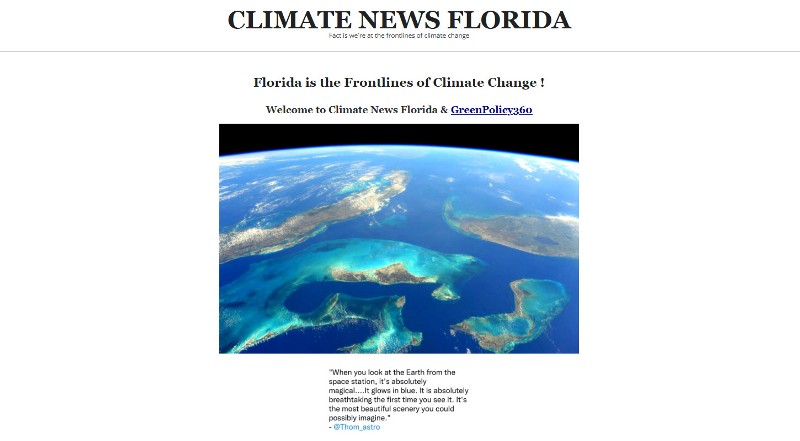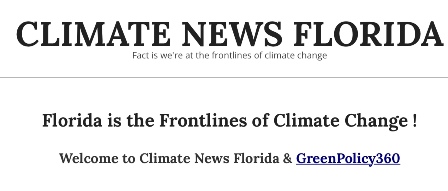File:ClimateNewsFlorida.com-Climate News Florida website.jpg
ClimateNewsFlorida.com-Climate_News_Florida_website.jpg (800 × 441 pixels, file size: 50 KB, MIME type: image/jpeg)
"Florida is the Frontlines of Climate Change"
Florida, Time for Facts, Science, Discussion, Debate & Solutions
- Climate Vulnerability, Climate Change, Extreme Weather, Rising Seas
ClimateNewsFlorida.com
- A GreenPolicy360 Project
🌎
Florida Climate Institute
- Florida Colleges/Universities Link Up to Tackle Climate Change
The Florida Climate Institute (FCI) is a multi-disciplinary network of national and international research and public organizations, scientists, and individuals concerned with achieving a better understanding of climate variability and change.
The FCI has eleven member universities – Florida A&M University (FAMU); Florida Atlantic University (FAU); the Florida Institute of Technology (FIT); Florida International University (FIU); Florida State University (FSU); Nova Southeastern University (NSU); the University of Central Florida (UCF); the University of Florida (UF); the University of Miami (UM); the University of South Florida (USF); and Stetson University (SU) – and is supported by relevant colleges, centers, and programs at these universities. UF and FSU initiated the FCI in 2010; FAU, UCF, UM, and USF formally joined in 2012; FIU formally joined in 2013; FAMU formally joined in 2014; FIT formally joined in 2015; and NSU formally joined in 2017.
The Climate Issue
Climate variability and change pose significant economic, food security, and environmental risks worldwide. Drought, storms with heavy rain, high winds, flooding, and freeze events cause billions of dollars in losses to the agricultural and natural resources sectors locally in Florida and globally. The Fourth Assessment Report (AR4) of the Intergovernmental Panel on Climate Change (IPCC) predicts that by the year 2100 global average temperature is likely to increase by 1.1 to 6.4°C (2 to 11.5°F), global mean sea level will rise from 0.18 to 0.59 m (7 to 23 inches), and increases in precipitation intensity and variability will increase the risk of both flooding and drought. The IPCC AR4 also states that many regions will experience considerable deviations from the global averages and there is tremendous uncertainty regarding the regional and local impacts of global changes. Some regions will warm more than the global average while others will warm less or even cool.
Much of the climate change information communicated to the public is based on IPCC projections that are both at the global level and relatively long-term (50 to 100 years). However, many climate stakeholders, including policy makers, farmers, and the public, also need information at local to regional levels and at shorter time scales. Climate stakeholders want reliable, scientifically-sound, region-specific climate information at multiple time scales to help evaluate various options for climate change adaptation and mitigation.
🌎
File history
Click on a date/time to view the file as it appeared at that time.
| Date/Time | Thumbnail | Dimensions | User | Comment | |
|---|---|---|---|---|---|
| current | 23:34, 5 November 2022 |  | 800 × 441 (50 KB) | Siterunner (talk | contribs) |
You cannot overwrite this file.
File usage
The following page uses this file:


